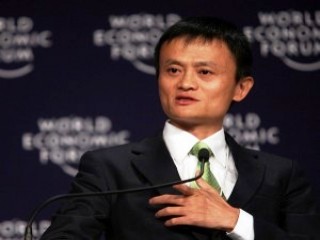
Jack Ma biography
Date of birth : 1964-09-10
Date of death : -
Birthplace : Hangzhou, Zhejiang Province, China
Nationality : Chinese
Category : Science and Technology
Last modified : 2011-09-07
Credited as : computer engineer, Alibaba.com, e-commerce site
2 votes so far
Born in 1964, Ma grew up in Hangzhou, a city in an eastern coastal province of Zhejiang not far from Shanghai. As a youngster, Ma was determined to learn English, and once the first foreign visitors began arriving in Hangzhou thanks to China's new economic policies that opened up the country to the outside world in the late 1970s, he began showing up at the single hotel in Hangzhou that hosted the foreign tourists. For the next nine years, he came daily and offered a free tour of the city for English-speaking guests, which allowed him to practice his conversational English skills. He made his first trip outside of China in 1985 when he traveled to Australia. He recalled being stunned by the obvious prosperity, he told the San Francisco Chronicle some years later. "I was educated in China that we were the richest country in the world and that we were the happiest people in the world."
Ma earned a degree from the Hangzhou Teachers Institute in 1988, and took a job as a teacher there when he finished. His English skills were by then so proficient that he founded his own translation agency, and worked with some of the first U.S. companies doing business in China. In 1995, he traveled to the United States for the first time as an interpreter for one such venture, and contacted a friend from China who was living in Seattle by then. That stint as a houseguest provided his first contact with a personal computer, which were virtually nonexistent in China at the time. It was also his first contact with the Internet. "I was scared, because very few companies in China had computers. Computers were considered very high technology and very expensive," he remembered in the interview with the San Francisco Chronicle . "So my friend said, 'Jack, it's not a bomb, just touch whatever you want.'" Fascinated, he asked his friend to help him put up a website for his translation business, and began receiving e-mails almost immediately.
The Internet was an entirely new idea in China, but Ma returned and became one of the country's first Web entrepreneurs, though this was still the dial-up connection era. "The day we got connected to the Web, I invited friends and TV people over to my house," he told New York Times writer David Barboza, "[and] we waited three and a half hours and got half a page. We drank, watched TV and played cards, waiting. But I was so proud. I proved the Internet existed." He soon launched China Pages, an Internet company that is believed to have been the first commercial website in China, with $2,000 he borrowed from family and friends, and spent a little over a year as general manager for a joint telecommunications venture with Chinese government. That failed, and he took a job with the Ministry of Foreign Trade and Economic Cooperation, which served to introduce him to Yahoo!'s Taiwan-born co-founder Jerry Yang in 1998.
Inspired once again to test China's free-market information-technology waters on his own, he culled enough money this time, $60,000 from a new batch of investor-friends to launch Alibaba.com in 1999. Designed as a business-to-business (B2B) marketplace that connected buyers and sellers of various goods, it quickly emerged as a successful new player in the global bazaar, and another round of financing this one $25 million arrived when some major financial players showed interest. Among them were the Wall Street investment bank Goldman Sachs, and Japanese Internet entrepreneur Masayoshi Son.
Alibaba.com hit the one-million user mark in March of 2002, and finally began making money later that year, as Ma had promised its backers. Initially it had been free to join, but offered a host of extras, such as personalized Web pages, that brought in revenue. He hoped to someday take the company public, which is based in his hometown of Hangzhou one of China's fastest-growing cities but its formal paperwork was filed in Hong Kong to take advantage of the island-city's special economic status. "Alibaba is founded by Chinese, but it's not a Chinese company," he asserted in the San Francisco Chronicle . "It belongs to Alibaba's users, all over the world."
In 2003, Ma stepped into the consumer online auction marketplace with Taobao.com, which means "searching for treasure." It quickly emerged as a serious rival to eBay, a relative newcomer to the Chinese consumer market, and its success helped Ma ink a historic 2005 deal with Yahoo!, the U.S.-based online consumer services provider. Yahoo! bought a 40 percent stake in Alibaba.com for $1 billion. In return, Alibaba valued at the time of the deal as worth $4 billion assumed control over Yahoo! China's operations. His company was now China's largest Internet company, with Ma as chief executive officer.
The Yahoo! deal allowed Ma to begin working on his next Internet triumph: to make Yahoo!'s Chinese-language search engine as pared-down and fast as Google or Baidu, the top search engine in China at the time. Yahoo! China does have to abide by some freedom-of-information restrictions imposed by the Chinese government, such as automatically blocking domestic-user access to websites about Chinese political reform or human rights. Ma is a firm believer, however, in the revolutionary possibilities that technology brings. "The Internet in China is definitely improving China in many ways: financially, politically and socially," he told the San Francisco Chronicle . "Today, I think the Chinese government is changing very quickly. Whether it's because of the Internet or not, I don't know."
















